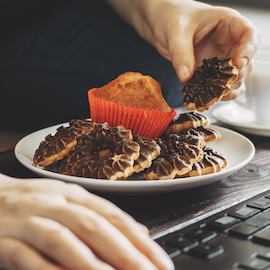 If you feel fatigued after consuming a carb-heavy meal, you are definitely not alone. The post-carb “crash” is a real, recognized phenomenon, which can leave you feeling more tired than before you had the meal or snack. Luckily, there are ways to do something about this, which can help you minimize its effects or avoid it completely.
If you feel fatigued after consuming a carb-heavy meal, you are definitely not alone. The post-carb “crash” is a real, recognized phenomenon, which can leave you feeling more tired than before you had the meal or snack. Luckily, there are ways to do something about this, which can help you minimize its effects or avoid it completely.
How do carbs work?
Carbohydrates are one of the main classes of dietary nutrients. Many different foods fall into the carbohydrate category, including potatoes, baked goods such as bread, and rice and pasta. There are processed and unprocessed versions of many carbs. They help provide energy fast and are broken down in the body by amylase, an enzyme which helps to turn carbs into fuel for the body or store the energy as fat if it’s not required immediately.
What causes the crash?
Consuming carbs, especially poor-quality “empty” carbs such as soft drinks, sweets, and crisps, provides our bodies with a short-term energy rush. However, this is soon counteracted by the release of insulin into the bloodstream to regulate blood glucose levels. Sugar in the blood is swiftly removed and sent to your muscles, liver, and other organs, and it is this sudden removal which makes you feel tired and lethargic. This sudden drop in blood sugar is termed hypoglycemia.
To avoid tiredness, consume slow-digesting carbs.
There is an easy way to counteract this tiredness and avoid the hypoglycemic crash in the first place. What you need to do is avoid the simple, empty carbs and replace them with complex carbs which digest slowly and release their energy over the course of the day. They stay in your system for much longer and trigger a slower insulin release.
Types of slow-digesting carbs.
There are many different types of slow-digesting, complex carbohydrates which you can add to your daily diet to avoid crashing and feeling more tired than you should. Good examples which you should include in your meals and snacks include nuts, whole-grain pasta and bread, legumes, oats, wild or brown rice, and a good number of fruits and vegetables. Include these foodstuffs and you will not only increase your energy levels but you will also gain several other nutrients to help promote good health.
Some other tips.
Whilst swapping empty for more complex carbohydrates is a main way to avoid feeling tired after a carb-rich meal, swapping in some protein is a great idea. Protein takes longer to digest and helps avoid the insulin spike which leads to a crash. Add some nuts, beans, or lean meat and fish in and avoid that tired feeling throughout the day.
If you’re feeling tired after a carbohydrate-heavy meal, you’re not alone. With these simple diet tips, you can avoid a hypoglycemic crash and remain energized throughout the day. If you are concerned it may be a symptom of something more serious, however, you should consult a doctor or medical professional.